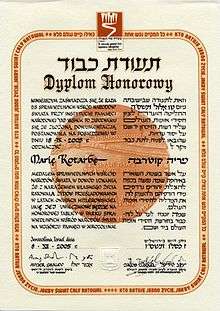Tadeusz Pankiewicz
| Tadeusz Pankiewicz | |
|---|---|
 Tadeusz Pankiewicz | |
| Born |
21 November 1908 Sambor, Poland |
| Died |
5 November 1993 Kraków |
| Nationality | Polish |
| Occupation | Pharmacist |
| Known for | Holocaust rescue |
Tadeusz Pankiewicz (November 21, 1908 in Sambor – November 5, 1993 buried in Kraków), was a Polish Roman Catholic pharmacist,[1] operating in the Kraków Ghetto during the Nazi German occupation of Poland. He was recognized as "Righteous Among the Nations" by Yad Vashem on February 10, 1983, for rescuing countless Jews from the Holocaust.
Pankiewicz studied at the Jagiellonian University in Kraków. In 1933, he took over the proprietorship of the "Under the Eagle" pharmacy (Apteka Pod Orłem) founded in 1910 by his father Jozef.[2] The pharmacy was situated on Plac Zgody (formerly Mały Rynek square) in Kraków's Podgórze district. Its prewar clientele included both Gentile Poles and Jews.
In the Kraków Ghetto
Under the German Nazi occupation of Poland during World War II, Podgórze district was closed off in March 1941 as a ghetto for local area Jewry. Within the walls of the Kraków Ghetto there were four prewar pharmacies owned by non-Jews. Pankiewicz was the only proprietor to decline the German offer of relocating to the gentile (non-Jewish) side of the city. He was given permission to continue operating his establishment as the only pharmacy in the Ghetto, and reside on the premises.[3] His staff were given passage permits to enter and exit the ghetto for work.
The often-scarce medications and pharmaceutical products supplied to the ghetto's residents, often free of charge, substantially improved their quality of life. In effect, apart from health care considerations, they contributed to survival itself. In his published testimonies, Pankiewicz makes particular mention of hair dyes used by those disguising their identities and tranquilizers given to fretful children required to keep silent during Gestapo raids.
The pharmacy became a meeting place for the ghetto's intelligentsia, and a hub of underground activity. Pankiewicz and his staff, Irena Drozdzikowska, Helena Krywaniuk, and Aurelia Danek, risked their lives to undertake numerous clandestine operations: smuggling food and information, and offering shelter on the premises for Jews facing deportation to the camps.
After World War II
On February 10, 1983, Tadeusz Pankiewicz was awarded recognition as a "Righteous Among the Nations" for his wartime activities in rescuing Jews. In April of that year, he was present at the inauguration of the national heritage museum housed in the Apteka Pod Orłem building. Tadeusz Pankiewicz died in 1993 and is buried in Kraków's Rakowicki Cemetery.
In April 1983, the "Pod Orlem" pharmacy, located at No.18 Plac Bohaterów Ghetta (Ghetto Heroes Plaza, renamed), opened its doors as the Museum of National Remembrance, featuring the history of Kraków Jewry with special focus on the ghetto period. In 2003, it became affiliated with the municipal Historical Museum of Kraków. The wartime activities of Pakiewicz and his staff are featured in an exhibition on the history of the Jewish ghetto in Kraków.
The pharmacy was featured in the Academy Award-winning film, Schindler's List. The film's director Steven Spielberg donated $40,000 for the building's preservation, for which he was honored by the city of Kraków with its prestigious "Patron of Culture" award for the year 2004.
Footnotes
- ↑ Gilbert, Martin, The Holocaust: A History of the Jews of Europe, p. 356 (1987 Macmillan)
- ↑ Museum of National Remembrance at "Under the Eagle Pharmacy"
- ↑ David M. Crowe, The Holocaust: Roots, History, and Aftermath. Published by Westview Press. Page 180.
Bibliography
- The Krakow Ghetto Pharmacy by Tadeusz Pankiewicz, translated from the Polish by Garry Malloy. Kraków: Wydawnictwo Literackie, 2013. ISBN 978-83-08-05114-6.
- The Cracow Ghetto Pharmacy (translation by Henry Tilles of Apteka w getcie krakowskim). New York: Holocaust Library, 1987. ISBN 0-89604-086-0, 089604 0879. The book Apteka w Getcie Krakowskim is also available in Hebrew with reprinted editions, published by Yad Vashem and translated from Polish by writer Miriam Akavia.
- Wladyslaw Bartoszewski and Zofia Lewin, Righteous Among Nations: How Poles helped the Jews, 1939 - 1945. London: Earlscourt Publications, 1969, pp. 222–226. Includes first-person testimony by Pankiewicz.
- Wladyslaw Bartoszewski and Zofia Lewin, The Samaritans: Heroes of the Holocaust (translated from the Polish: Ten jest z ojczyzny mojej, 1966), ed. Alexander T. Jordan. N.Y.: Twayne Publishers, 1970, pp. 173–178.
- Sara Bender and Shmuel Krakowski, eds., The Encyclopedia of the Righteous Among the Nations: Rescuers of Jews during the Holocaust. Poland, Volume II. Jerusalem: Yad Vashem Publications, 2004, p. 579.
External links
-
 Media related to Kraków Ghetto at Wikimedia Commons
Media related to Kraków Ghetto at Wikimedia Commons - The "Under the Eagle" Pharmacy guidebook at Historical Museum of Kraków homepage.
- Tadeusz Pankiewicz – his activity to save Jews' lives during the Holocaust, at Yad Vashem website
